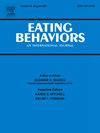Adopting vegetarian and vegan eating patterns: Associations with disordered eating behaviors among young adult college students
IF 2.4
3区 医学
Q2 PSYCHIATRY
引用次数: 0
Abstract
Introduction
Vegan and vegetarian diets are increasingly popular, though there is concern that disordered eating can drive, emerge, or intensify from the choice to adopt dietary restrictions.
Objective
We sought to ascertain whether disordered eating or weight-control behaviors are associated with newly adopting a vegetarian/vegan diet during college and to assess symptom awareness and treatment utilization.
Methods
Data came from 11,503 students in the Healthy Minds Study spanning 2015–2021. We examined associations between (i) the SCOFF eating disorder screener and (ii) symptom-specific items from the Eating Disorder Examination Questionnaire, and recent adoption of a vegan/vegetarian diet. Participants' knowledge of eating disorder symptoms and experiences with treatment utilization were also assessed.
Results
Five-hundred thirty-two participants (∼5 %) reported adopting a vegan/vegetarian diet. Compared to students who did not change eating patterns, those who adopted vegetarianism/veganism had higher past-month prevalence of binge eating (25 % vs, 16 %), compulsive exercise (18 % vs. 9 %), and fasting (12 % vs. 8 %). Each behavior was significantly associated with greater odds of having recently adopted a vegetarian/vegan diet. A positive SCOFF screen (2+ items) was associated with 1.79-times (95 % CI: 1.48, 2.16) greater odds of newly adopting a vegetarian/vegan diet. There were no observed differences between groups with respect to knowledge of eating disorder symptoms or treatment-seeking attitudes and behaviors.
Discussion
Disordered eating or weight-control behaviors were prevalent in this population of young adults and were associated with adopting a vegetarian/vegan diet, though awareness and help-seeking were not elevated among those with higher eating disorder risk.
求助全文
约1分钟内获得全文
求助全文
来源期刊

Eating behaviors
Multiple-
CiteScore
4.20
自引率
3.60%
发文量
65
审稿时长
60 days
期刊介绍:
Eating Behaviors is an international peer-reviewed scientific journal publishing human research on the etiology, prevention, and treatment of obesity, binge eating, and eating disorders in adults and children. Studies related to the promotion of healthy eating patterns to treat or prevent medical conditions (e.g., hypertension, diabetes mellitus, cancer) are also acceptable. Two types of manuscripts are encouraged: (1) Descriptive studies establishing functional relationships between eating behaviors and social, cognitive, environmental, attitudinal, emotional or biochemical factors; (2) Clinical outcome research evaluating the efficacy of prevention or treatment protocols.
 求助内容:
求助内容: 应助结果提醒方式:
应助结果提醒方式:


